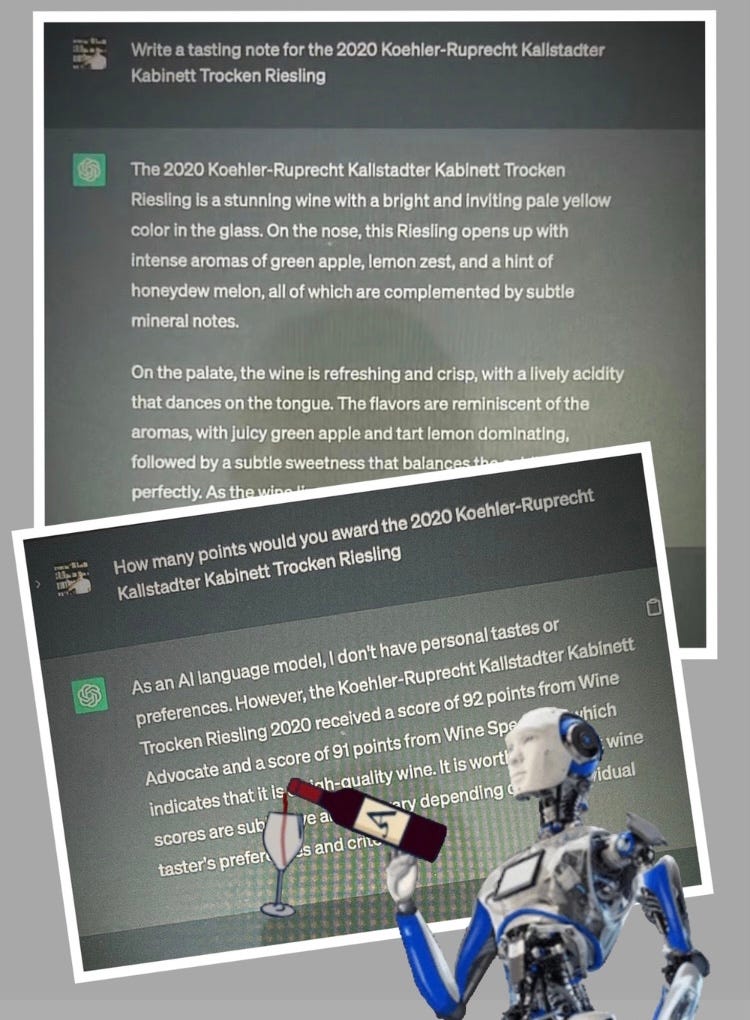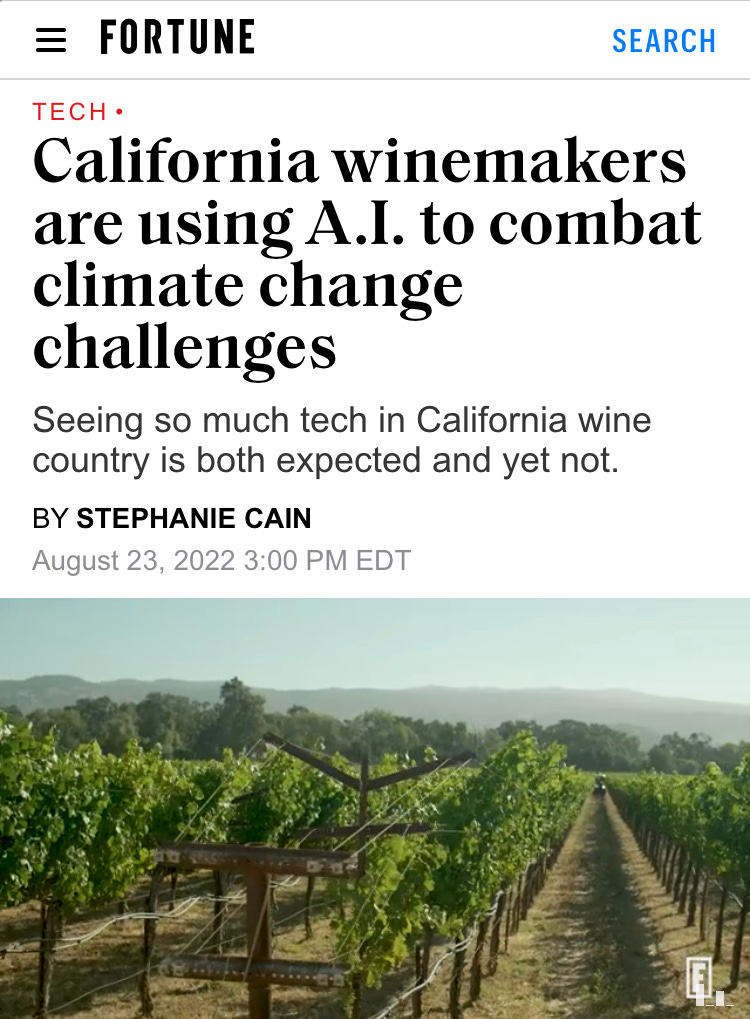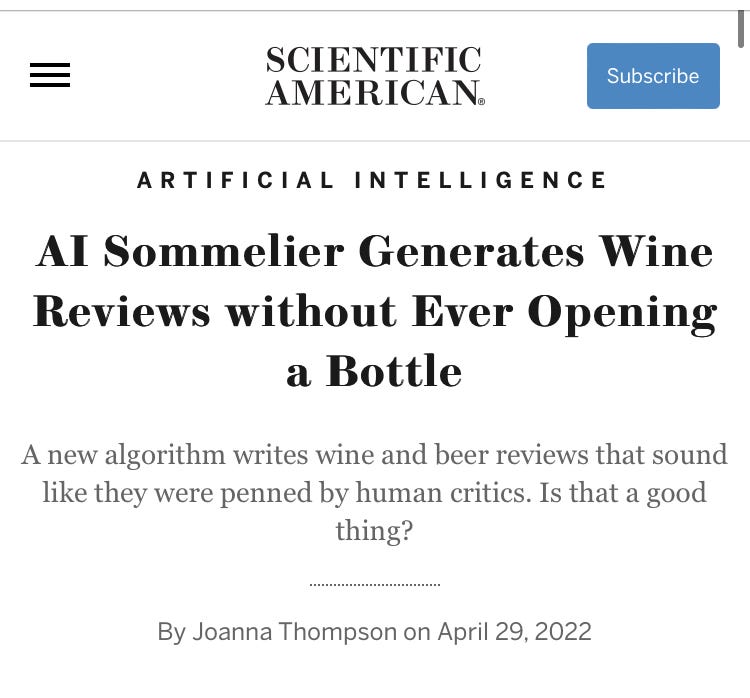Yesterday I saw a story on Instagram that got me thinking about the potential impact Artificial Intelligence (AI) may have on the wine industry. Jake Skakun — who is the Wine Director at Toronto’s Grey Gardens, Le Swan, and Bar Vendetta — posted a story asking ChatGPT (a tool that allows users to have human-like conversations with an AI chatbot) to write a tasting note for the 2020 Riesling Kabinett Trocken Kallstadter from Germany’s Koehler-Ruprecht. The chatbot typed up its answer in seconds, explaining how “on the palate, the wine is refreshing and crisp, with a lively acidity that dances on the tongue.” Jake next asked how many points it would award that wine, and before providing scores from published wine publications, the bot stated that “as an AI language model” it doesn't “have personal tastes or preferences.” This issue of the newsletter, which was created with 100% human content, looks at some of the ways AI may impact the wine industry.
Incorporating AI in Business Operations. In Wine Industry Advisor’s How AI Will Be a Game-Changer for the Wine Industry, Nathan Westfall writes about how AI can be used to stay competitive. Westfall writes that AI can be used to improve customer service by using chatbots on websites to interact with customers in real time, and to make personalized wine recommendations:
By analyzing their taste profiles, dietary restrictions or even the occasion they’re celebrating through use of a few targeted questions, ChatGPT can suggest wines from your catalog that would best meet their needs. This not only streamlines the decision-making process for customers, it also adds a touch of personalization, making them feel valued and understood.
Adding a ”touch of personalization” without the use of an actual person is a bit of head scratcher for me but anywho. Westfall also suggests using AI to create content for social media and marketing campaigns.
Using AI in the Vineyard. In Fortune's California winemakers are using A.I. to combat climate change challenges, Stephanie Cain wrote about how wineries are adopting technology to help navigate extreme weather events. In 2020, the California wine industry lost an estimated 165,000-325,000 tons of grapes, valued at $601 million, due to loss caused by wildfires, according to the Allied Grape Growers and the California Association of Winegrape Growers.
Gamble Family Vineyards, a small boutique winery in Napa Valley, uses drones to collect data on vine health, and wireless soil sensor networks to support irrigation practices.
The soil saturation technology alone has saved him tens of thousands of gallons of water per acre, simply by better understanding “when and when not to turn on the spigot.”
The article goes on to talk about other tech tools that can be used in the vineyard including Terraview, software that helps wine producers make sustainable choices during production; and ADCON Telemetry’s Decision Support System, which is used for crop management.
Can a Bot Taste Wine Write a Wine Review? In AI Sommelier Generates Wine Reviews without Ever Opening a Bottle, Scientific American wrote about an AI algorithm that writes wine reviews “that are largely indistinguishable from those penned by a human critic.” Keith Carlson, a computer engineer who co-developed the algorithm, trained the program using reviews from Wine Enthusiast magazine.
Although the algorithm seemed to do well at collecting many reviews and condensing them into a single, cohesive description, it has some significant limitations. For instance, it may not be able to accurately predict the flavor profile of a beverage that has not been sampled by human taste buds and described by human writers.
Carlson also explained that while their algorithm could have produced reviews about anything, wine reviews made a good template for AI-generated text given their specific variables (ie. grape, region, vintage) and limited wine description vocabulary, with Carlson adding that “people talk about wine in the same way, using the same set of words,” e.g., oaky, floral, dry, etc. But the language of wine is changing — and maybe not everyone is on board with terms like crushable, salty, or natural, for example, but these New Wine Words™️ can sometimes be more relatable and easily understood — and I wonder if AI knows that.
Come for the natural and low-intervention wine content, but subscribe for the occasional technology content!







Thoroughly fabulous newsletter. I am a human.